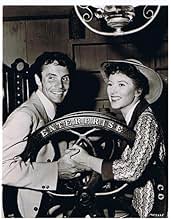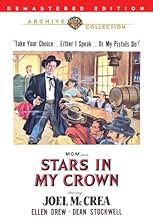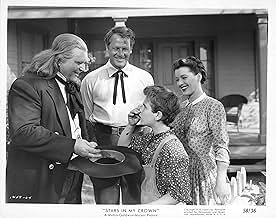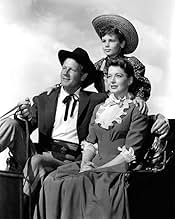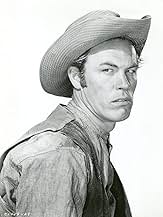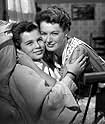AVALIAÇÃO DA IMDb
7,4/10
2,7 mil
SUA AVALIAÇÃO
Adicionar um enredo no seu idiomaIn 1865, the small Southern town of Walesburg has become so dangerous that Parson Josiah Doziah Gray gives his sermons while holding a gun.In 1865, the small Southern town of Walesburg has become so dangerous that Parson Josiah Doziah Gray gives his sermons while holding a gun.In 1865, the small Southern town of Walesburg has become so dangerous that Parson Josiah Doziah Gray gives his sermons while holding a gun.
- Direção
- Roteiristas
- Artistas
- Prêmios
- 1 vitória no total
Marshall Thompson
- Narrator
- (narração)
James Arness
- Rolfe Isbell
- (não creditado)
Jessie Arnold
- Annie
- (narração)
- (não creditado)
Polly Bailey
- Mrs. Belsher
- (não creditado)
Avaliações em destaque
STARS IN MY CROWN is a nice slice of life movie about the life about a country preacher in the years immediately following the Civil War. Joel McCrea plays the preacher and Dean Stockwell plays an orphan that is taken in by the preacher and his wife. However, the film isn't just about them but about the people in the town. It focuses quite a bit on a young and somewhat cocky doctor as well as a gentle and beloved Black man (played exceptionally by the wonderful character actor, Juano Hernandez).
Both plots are exceptional--particularly the one involving Hernandez because the film dared in 1950 to attack prejudice--something Hollywood was seldom willing to do at that time. Often, when Blacks were in mainstream films, they were one-dimensional and the racial divide in America was ignored. For 1950, this was a brave film--though some will no doubt notice that the film is perhaps a bit overly idealistic in how it portrayed how the White Southerners generally loved Hernandez.
The plot involving the doctor was also rather touching and had a lot to say about the supposed gap between faith and science. I particularly liked how McCrea AND the doctor struggled with this divide.
STARS IN MY CROWN reminds me of another film that is also about a small town preacher (ONE FOOT IN HEAVEN) and both have a nice gentle spirit but also aren't preachy or saccharine despite being films about the clergy. I especially like how both ministers (in this case, Joel McCrea and in the other film, Frederic March) were human beings--not dull caricatures. Some may be offended because the films AREN'T really religious movies (you get no Gospel or Bible-thumping here) but for a general audience these films are sure to please. I recommend both heartily because they were written so well and the acting was on target. See these films.
Both plots are exceptional--particularly the one involving Hernandez because the film dared in 1950 to attack prejudice--something Hollywood was seldom willing to do at that time. Often, when Blacks were in mainstream films, they were one-dimensional and the racial divide in America was ignored. For 1950, this was a brave film--though some will no doubt notice that the film is perhaps a bit overly idealistic in how it portrayed how the White Southerners generally loved Hernandez.
The plot involving the doctor was also rather touching and had a lot to say about the supposed gap between faith and science. I particularly liked how McCrea AND the doctor struggled with this divide.
STARS IN MY CROWN reminds me of another film that is also about a small town preacher (ONE FOOT IN HEAVEN) and both have a nice gentle spirit but also aren't preachy or saccharine despite being films about the clergy. I especially like how both ministers (in this case, Joel McCrea and in the other film, Frederic March) were human beings--not dull caricatures. Some may be offended because the films AREN'T really religious movies (you get no Gospel or Bible-thumping here) but for a general audience these films are sure to please. I recommend both heartily because they were written so well and the acting was on target. See these films.
And they didn't get one.
"Stars in My Crown" was Joel McCrea's favorite film. He's cast against type here, playing the parson, Josiah Gray, who settles with his wife (Ellen Drew) and her nephew John (Dean Stockwell) in a small town.
At first he's accepted by the community, who help him build his church. However, not everyone is crazy about him, including Daniel Harris Jr. (James Mitchell) who has taken over his late father's practice.
There are some dark forces at work, including an attempt to take land owned by a black farmer (Juano Hernandez). The violence against him escalates, but he stands firm.
What was interesting to me about this film was that citizens of the town become infected with typhoid. The first one hit is John. When Josiah attempts to continue to work in the community with his flock, the doctor accuses him of spreading the disease as more and more people become ill. The family become pariahs.
This isn't the exact scenario with COVID, though some of the sentiments are the same as people play the blame game and deal with suffering and death in their families.
"Stars in My Crown" is family entertainment, a story of the power of prayer and the need for courage in the face of difficulties. It's a lovely film, and while some may think Joel McCrea was miscast, I don't. Tough, charismatic, and plain speaking, he makes Josiah the kind of pastor any community would be proud to have.
"Stars in My Crown" was Joel McCrea's favorite film. He's cast against type here, playing the parson, Josiah Gray, who settles with his wife (Ellen Drew) and her nephew John (Dean Stockwell) in a small town.
At first he's accepted by the community, who help him build his church. However, not everyone is crazy about him, including Daniel Harris Jr. (James Mitchell) who has taken over his late father's practice.
There are some dark forces at work, including an attempt to take land owned by a black farmer (Juano Hernandez). The violence against him escalates, but he stands firm.
What was interesting to me about this film was that citizens of the town become infected with typhoid. The first one hit is John. When Josiah attempts to continue to work in the community with his flock, the doctor accuses him of spreading the disease as more and more people become ill. The family become pariahs.
This isn't the exact scenario with COVID, though some of the sentiments are the same as people play the blame game and deal with suffering and death in their families.
"Stars in My Crown" is family entertainment, a story of the power of prayer and the need for courage in the face of difficulties. It's a lovely film, and while some may think Joel McCrea was miscast, I don't. Tough, charismatic, and plain speaking, he makes Josiah the kind of pastor any community would be proud to have.
Yes this was a good film mostly on the strength of its ensemble cast. You really can't do much better than Ed Begley, Jim Arness, Arthur Hunnicutt and the great Alan Hale (Sr). The leads McCrea, Drew, and Stockwell are good also.
I didn't see the script as being particularly realistic. Maybe a preacher could talk a clan mob out extreme violence? This would not have happened in a film like "To Kill a Mockingbird" which came along about ten years later, also involving a child narrating the film as an adult like "Stars in my Crown."
But I liked the film's dealing with their health crises and the conflict between medicine --such as it was in that time period-- and the idea that prayer had a factor in the healing process.
I didn't see the script as being particularly realistic. Maybe a preacher could talk a clan mob out extreme violence? This would not have happened in a film like "To Kill a Mockingbird" which came along about ten years later, also involving a child narrating the film as an adult like "Stars in my Crown."
But I liked the film's dealing with their health crises and the conflict between medicine --such as it was in that time period-- and the idea that prayer had a factor in the healing process.
It gets high marks because of Joel McCrea right off. Then, it is a Western and there is always so much to learn about the early wild days and how towns got started along with laws, rules, regulations and all the rest. I always notice how the buildings of these start-up towns were built one right next to another. One fire takes them all out. I wonder how many times a town was actually re-built from fire losses? Notice too the streets and roads. Good community flick with everyone knowing everyone else and helping each other too. What an interesting way to live and grow up in. You got characters both good and not so good, the Klan, greed, fever, love interest, and a nice, happy ending. Such clean, fun and wholesome entertainment. Even if it is not true to life it can be and restores faith in human-kind just by watching. Warm and fuzzies will visit with you guaranteed. Narrator does an excellent job helping us to get the flick and not work too hard. Pay attention to Uncle Famous and his attitude on life. He lives simply, has all he needs, bothers no one likes everybody and is thankful just to be here. What a role model if there ever was one. This movie shows you what life can be like if we just let it. Good sandwich movie and tasty drink with a snack to follow will keep you happy and content to the satisfying end
This, the second of director Jacques Tourneur's westerns after CANYON PASSAGE and one of several collaborations with actor Joel McCrea, finds him at least at first sight as far removed from the ambiguous psychological Gothic horror films he became famous through a couple years back for Val Lewton's RKO horror unit, yet once we scratch the surface, peel back the layers of faith-restoring sentimentality which lies at the film's core, we'll find this can be a pretty dark film.
Not only because the life of a small rural town in the post-Civil War South has to face a typhoid epidemic and Klan racism because the 'family' nature of the film ensures these are merely obstacles to be overcome, each of them a lesson learned in Christian love and brotherhood not only for the characters but also for the audience, but mostly because of the way Tourneur shoots the major set-pieces that revolve around them. Going back to what he learnt next to Val Lewton at RKO, Tourneur gives an otherwise saccharine film a dark underbelly, Klansmen pinning threatening notes on negros in front of burning crosses et al.
Yet STARS IN MY CROWN never feels like a film whose message and theme is beneath the director. Tourneur approaches the story in earnest. The truth is that it takes a while for things to get going. That the film is a bit too episodic and scattershot to really register until the final 15 minutes when parson Joel McCrea has to face off alone with a mob of Klansmen to save the life of a negro. That the small vignettes scattered throughout the film push the two major plots (smalltown biggotry and typhoid epidemic) a bit too far apart, the result making the first half a pretty meandering anemic affair. But the denouement, for all its saccharine 'everybody gets together to sing hymns in the church' quality, feels honest and I find it hard to fault such a film. Building something as emotionally earnest and unassuming as this is harder than tearing it down with cynicism.
Not only because the life of a small rural town in the post-Civil War South has to face a typhoid epidemic and Klan racism because the 'family' nature of the film ensures these are merely obstacles to be overcome, each of them a lesson learned in Christian love and brotherhood not only for the characters but also for the audience, but mostly because of the way Tourneur shoots the major set-pieces that revolve around them. Going back to what he learnt next to Val Lewton at RKO, Tourneur gives an otherwise saccharine film a dark underbelly, Klansmen pinning threatening notes on negros in front of burning crosses et al.
Yet STARS IN MY CROWN never feels like a film whose message and theme is beneath the director. Tourneur approaches the story in earnest. The truth is that it takes a while for things to get going. That the film is a bit too episodic and scattershot to really register until the final 15 minutes when parson Joel McCrea has to face off alone with a mob of Klansmen to save the life of a negro. That the small vignettes scattered throughout the film push the two major plots (smalltown biggotry and typhoid epidemic) a bit too far apart, the result making the first half a pretty meandering anemic affair. But the denouement, for all its saccharine 'everybody gets together to sing hymns in the church' quality, feels honest and I find it hard to fault such a film. Building something as emotionally earnest and unassuming as this is harder than tearing it down with cynicism.
Você sabia?
- CuriosidadesCast includes a young James Arness and Amanda Blake. They appeared together for 19 (of 20) seasons on the television series Gunsmoke (1955) as Matt Dillon and Kitty Russell.
- Erros de gravaçãoMovie state narrator states "the first hard years following the war between the states". The title song was not written until 1897.
- Citações
John Kenyon: There's no writin' on here. This ain't a will.
Josiah Doziah Gray: Yes, it is, son. It's the will of God.
- ConexõesReferenced in Os Vencidos (1953)
Principais escolhas
Faça login para avaliar e ver a lista de recomendações personalizadas
- How long is Stars in My Crown?Fornecido pela Alexa
Detalhes
- Data de lançamento
- País de origem
- Idioma
- Também conhecido como
- Stars in My Crown
- Locações de filme
- Empresa de produção
- Consulte mais créditos da empresa na IMDbPro
Bilheteria
- Orçamento
- US$ 1.175.000 (estimativa)
- Tempo de duração1 hora 29 minutos
- Cor
- Proporção
- 1.37 : 1
Contribua para esta página
Sugerir uma alteração ou adicionar conteúdo ausente


